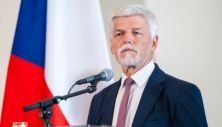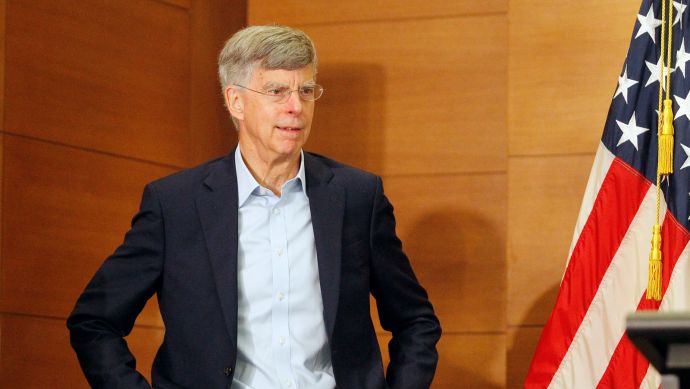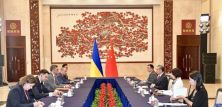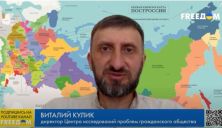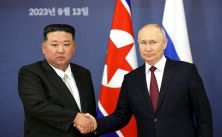Interview by VITALIY SYZOV, Special correspondent of Ukrainian foreign broadcasting in Europe, with WILLIAM TAYLOR, United States Ambassador to Ukraine (2006-2009).
The first question is, of course, about this decision of Russian authority, of mobilization, why you think they decided to do this? Because it’s very risky for them, for the government of Russia. Which possible consequences for Russia? And could the United States in some way react on this to provide Ukraine more significant help than it now to defeat it?
Yes. I think this decision to mobilize another 300,000 or more Russian soldiers is a sign of desperation. I think it’s a sign that President Putin knows that he is losing on the battlefield against a determined Ukrainian military. He recognizes that his soldiers are tired and depleted. He is he is running very short of manpower of soldiers, and he’s looking for replacement soldiers wherever he can find them. So far, he’s not been able to succeed. He has failed at getting enough prisoners from from jails or from the North Koreans or from the Russians or from the private sector or from the Syrians or Libyans. He has not been able to come up with soldiers that he needs. So he needs to do something to change the subject, to change the momentum. And even though, as you say, this is risky for him, it’s already we already see the risks, the political risks for him, that that the Russian people are now opposing this call up, this mobilization and. This. His supporters on the right are criticizing him for not being strong or so. Mr. Putin has found himself in a very difficult position and is trying to find a way out. It’s again, it shows to me that he is desperate.
What do you think about the result of this mobilization for the situation on the battlefield? Could it be effective? And could Ukraine expect some new offensive of Russian forces, for instance, some attacks in the key region on services like that?
But I don’t think that this mobilization will show any results in the near term over the next weeks or even months. It will take it’ll take weeks and probably months to. Recruit these soldiers. He’s having a hard time recruiting anyway. There’s a lot of resistance to this order. So he’s not having very much luck on the recruiting side. He then has to transport them, train them and equip them. That takes time as well. And then he has to try to get them into the into the battle into Ukraine. And that will take even more time. So I don’t look to see any real changes in the Russian forces, the level of forces or the quality of forces over the next several months. And during that time, the Ukrainian forces appear to be ready and able and in the process of. Continuing the counterattack, continuing the counteroffensive to push hard on the Russians that are now weak. The Russians, as President Putin has indicated, are now weak on the battlefield and the Ukrainian military is taking advantage of that weakness.
Does the Ukrainian army need some extra help, some new types of weapons to be so effective as it now after this Russian mobilization?
Yes. The United States and other NATO nations need to provide more weapons, more of the sophisticated, heavier, longer range weapons, both on the artillery rocket systems, as well as air defense, as well as I would say that they the Ukrainians need have requested more drones. Aircraft ought to be a consideration and armored vehicles. So, yes, the short answer is the Ukrainian military needs to continue to get the kind of equipment that the United States and the NATO’s allies have been providing. And even more of it, more of it, and more sophisticated versions of this of these weapons.
A lot of observers from I from the sphere of Russian, Russian nation, at least the is they think and supposes that this mobilization is the answer, not for West, but for East. After this summit in Samarkand, when Putin found that he he is alone in the world. What do you think could be this summit unsuccessful for Russia, this trigger which provoke provoke Putin more to provide this mobilization?
I think you’re right. That summit demonstrated that even the large nations that President Putin was counting on to support him, in particular China and India, as well as nations like Kazakhstan, are not supporting him, have questions about this invasion, have concerns about this invasion, invasion. They have asked him why he is invading Ukraine. They don’t. They’ve not been convinced that this is a good idea. So President Putin knows that he doesn’t have that kind of support. And again, it puts him in a difficult position both abroad with these allies as well as at home with the opposition to this mobilization, both from the from the bottom as well as from his is his nationalist right and from the the successful Ukrainian military attacks counter offensive in on the battlefield. So he is looking at three bad situations.
Iranian drones. They are in Ukraine now. We see reports, several videos, how they were used in Ukraine. What do you think? How the United States as a nation, they could prevent Iran from supplying these weapons to Russia?
It’s interesting that the Iranians have now denied that they are providing these these weapons, although you’re right. They’ve been found on the on the battlefield. So we know that the Iranians are doing this. And the United States should provide anti-aircraft air defense capabilities to the Ukrainians to enable them to defend against these drones. It is it is possible to defend against these drones, and they should do that. We’ve also provided and we should provide more of these of our drones to the Ukrainian military so that they can use these as well. The Ukrainian military using the drones extremely effectively and the volume and the capability of these drones should go up.
Almost a year ago, President Zelensky had visit to Washington. And I know that you have some meeting with him. And from my point of view, you have a very positive attitude towards Zelensky, and you had this attitude even before the invasion. What do you think about his behavior after the invasion? Do you expect that that former comedian would be effective military leader?
You’re right. I met President Zelensky when he was first inaugurated in 2019. I was there for his first seven months in office when he appointed his new cabinet. First Cabinet Prime Minister undertook a very successful parliamentary election, and I met with him on many occasions. I was always impressed then about his leadership capability, about his communications capability. So I was not surprised that he, in the face of this invasion, stepped up to a major role in Ukrainian history, a major role in the history of the world in opposition to this Russian invasion. He has demonstrated that he has the strong support of the Ukrainian people. The Ukrainian people support him. According to all the polls, he is able to make decisions in their favor and on their behalf, on the Ukrainian people’s behalf that have galvanized, have strengthened, have inspired not just the Ukrainian people, but the international community. The whole West is supporting Ukraine and President Zelensky has led that support. You asked about the military leadership. I think one of the strengths of President Zelensky is that he is allowing his military, his general officers to make the military decisions. As I understand it, he is allowing them to make the decision is not President Zelensky is not trying to tell them how to run the war. He, of course, as overall responsibility. And he, of course, has overall oversight over the operation of the war. But he knows that he’s not a general. He knows that he’s not been in the military. He knows that his general officers, his general staff, his military is very competent and is doing a very good job at defending the nation and indeed of pushing back the Russians out of his country. So I think that’s a strength he is delegating correctly to his military, the military decision. I think that’s a mark of a very good civilian leader during wartime.
I know that you have a close connection with a lot of Ukrainian military. You have even fought with Ukrainian paratroopers in your cabinet. What do you feel, when the 24th of February, when you realize that war started and maybe you get some good some messages from Ukraine and how it was for you?
It was a terrible shock on the 24th of February. Like it was to. Everyone around the world in Ukraine, in Europe, in the United States, was a terrible shock that President Putin would invade his neighbor. I did hear from my friends in the military, and you’re right, I’m very proud of my training with the Ukrainian military back when I was in Ukraine. They demonstrated to me the Ukrainian soldiers that I trained with back in 2008 demonstrated to me spirit. The competence. The bravery of the Ukrainian military. And so I was shocked that President Putin invaded. I was sure that the Ukrainian military would fight and fight hard and in the end, fight successfully to repel the Russians. And when they had tried to invade Ukraine.
A year ago, it was this massive withdrawal of United States Army from Afghanistan. And in some way it inspired, I think, Putin to invade Ukraine. He expected that situation would be the same as some that the president fled to some other country, that the civil services would be collapsed. What is the main difference between these two cases, Afghanistan and the Ukraine?
The main difference is. Ukrainian people and the Ukrainian leadership. Ukrainian people are now more united than ever. They started this unification years ago, and gradually this happened. But in 2014, when the Russians first invaded, Ukrainians began to go even closer together. And in 2022, on the 24th of February, Ukrainians consolidated their unity behind President Zelensky in response to the Russian invasion. And that’s different from what happened in Afghanistan. And Afghanistan is much more decentralized, more tribal. The leadership, as I say, in Ukraine. President Zelensky stayed in the capital, stayed in key. In Afghanistan, the government disappeared. The government fled. The government left Kabul and in a cave. The government stayed. The government showed bravery. The government showed determination. And the government led and is leading a successful defense against the Russians. So there’s a big difference between what happened in Afghanistan, what happened in Ukraine, and the difference is the Ukrainian people and the Ukrainian leadership. This probably surprised President Putin. President Putin probably thought that the Ukrainian leadership would not stay in Kyiv. He may have thought that, like in Afghanistan, the Ukrainian leadership would lead. President Putin may have thought that, like in Afghanistan, the Americans would not stay, would not be solid in behind their ally Ukraine. And in that case, President Putin was wrong. He made a mistake. He missed he misunderstood the Ukrainians. Misunderstood President Zelensky and he misunderstood the Americans, the Americans and President Zelensky. And Ukraine’s surprised President Putin by their determination and their bravery.
You know, you almost the zippers with President Putin. You are both from one generation. I don’t know. I understand that this is maybe strange visions, but from your point of view, why he’s saying that seventies they are better than ages and ages were better than nineties. Why he wants to rebuild this situation of, I don’t know, the Soviet era of imperial era. Why he likes to leave in past?
It’s a very good question. It’s a very good question. No one understands President Putin’s head. I am sure. I know. I don’t understand why he would think that the Soviet times were so good and that now is the time to reassemble the Soviet Union. I don’t understand that. President Putin. Could have had the opportunity to have a a nation, a Russia that was prosperous, that was surrounded by friendly nations. But no. President Putin decided he didn’t want a prosperous nation. He didn’t want to have friendly neighbors. He wanted to invade his neighbors. He invaded Georgia, as we know, and in 2008, invaded Ukraine in 2014, and invaded again. He has made the decisions. That have brought the Russians down. He has made terrible decisions for his country, for Russia. He may think that by trying to reassemble the Soviet Union back in the seventies and eighties, that he would be a great leader, a great Russian leader. Well, it turns out he’s he’s going to have destroyed Russia. He will go down in history as a terrible Russian leader. So I don’t understand what’s in his head. All I know is he’s made a major mistake, a major blunder, a terrible decision by invading Ukraine.
